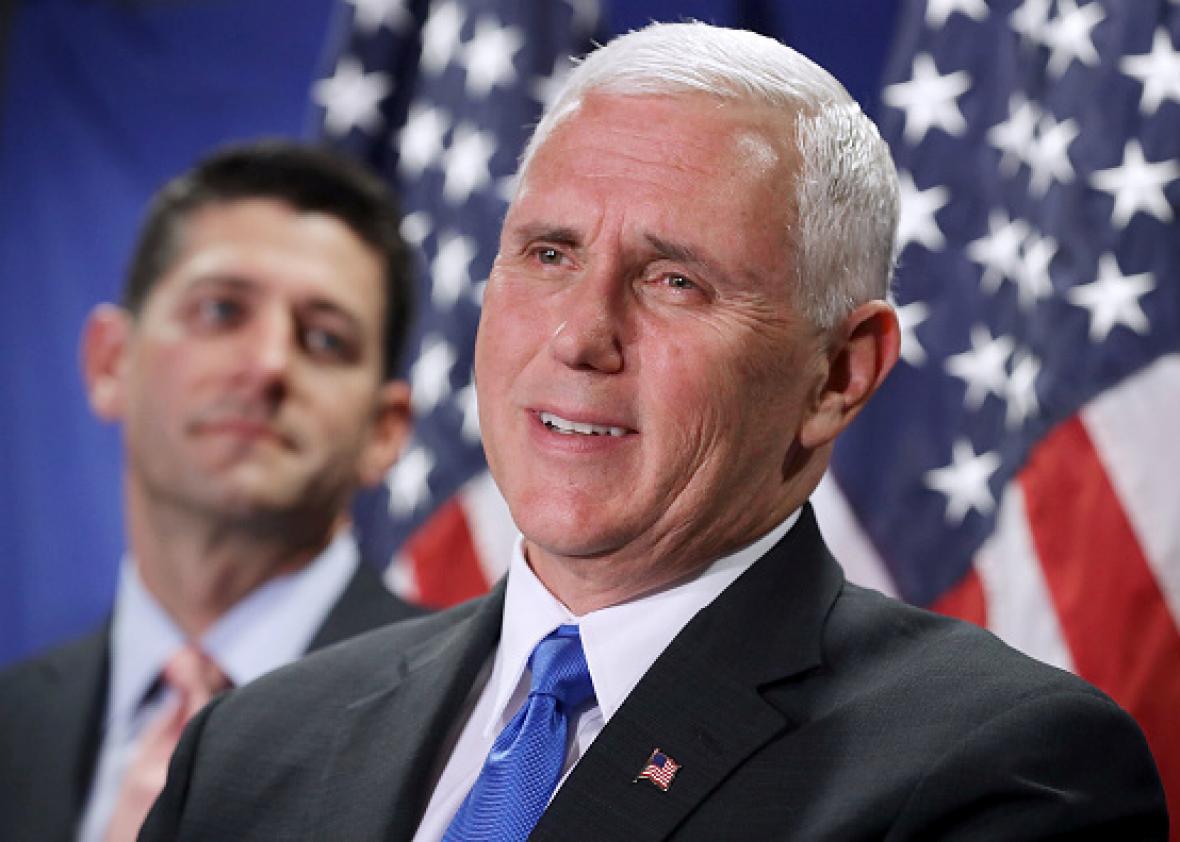Republican vice presidential nominee Mike Pence declined to describe former Ku Klux Klan Grand Wizard David Duke as “deplorable” for the second time in as many days on Tuesday.*
During a press conference after attending a meeting with House Republicans, Pence said that Duke—who is running for Senate as a Republican in Louisiana and is a staunch Donald Trump supporter—was a “bad man,” but that he wouldn’t call him “deplorable” because he wasn’t in the “name-calling business.” (Apparently calling someone a “bad man” isn’t name-calling, but calling someone “deplorable” is.)
“For all the world, I have no idea why this man keeps coming up,” the Indiana governor said. “Donald Trump and I have denounced David Duke repeatedly. We have said we do not want his support and we do not want the support of people who think like him. And yesterday, I was asked a question about that and I repeated that again. And the simple fact is that I am not in the name-calling business.”
Duke has been a proud supporter of Trump for a various number of reasons, including his support for Trump’s immigration policies and belief that the Republican nominee stands up to “Jewish moneybags” and the “Jewish media establishment.”
On Monday, Pence was asked by CNN’s Wolf Blitzer whether Duke was “deplorable”—the word used by Hillary Clinton to describe a substantial portion of Trump supporters—and Pence gave a similar answer to the one he did in the press conference. Duke responded by voicing his support for Pence and the vice presidential candidate’s rejection of this “absolute controlled media.”
Again on Monday, Pence rejected the word deplorable to describe Duke, saying it would only serve to “validate the language that Hillary Clinton used to describe the American people.”
Pence was clearly seeking to reject Clinton’s language as a way of maintaining his ability to attack her for it, rather than to defend one of the most prominent white supremacists in the country.
“Hillary Clinton wasn’t talking about that bad man,” he said of Clinton’s since-walked-back remarks that roughly half of Trump’s supporters were “racist, sexist, homophobic, xenophobic, Islamophobic.”
“She was talking about people all across this country who are coming out in record numbers to stand by Donald Trump and to stand with him in his vision to make America great again,” Pence continued. “We’ll call on her again to apologize and retract her comments. The only thing she said so far is that she was wrong about the math, I guess, and she’s sorry she said half.”
As Slate’s Jamelle Bouie and the Washington Post’s Dana Milbank have written, as impolitic as Clinton’s statements were, multiple analyses of racial animus among the electorate show that Clinton’s original number probably wasn’t wrong.
Pence and Trump, though, are clearly looking to capitalize on the impression that Clinton was trashing a large portion of decent American citizens for no good reason and to make that a central theme in the closing months of the campaign. On Monday, Trump released a new TV ad saying that Clinton was “viciously demonizing hard-working people like you.”
And in his press conference, Pence went so far as to mischaracterize Clinton’s remarks as describing Trump supporters as “not American.”
“She said that, at the time, half of the people supporting Donald Trump and I were irredeemable, were not American,” Pence said. “Frankly, I’ve never heard a major party candidate in the United States speak about the American people with such contempt.”
Again, it seems as though Pence’s refusal to describe Duke as deplorable is more about maintaining that line of attack on Clinton than actually defending Duke, and we will soon see if it is a worthwhile trade-off.
*Correction, Sept. 13, 2016: This post originally misidentified the Ku Klux Klan as the Klu Klux Klan.
